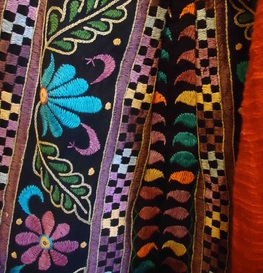Fair Trade at Two Fish Gallery

Fair Trade is a global trade model that allows shoppers to quickly identify products that were produced in an ethical manner. Fair Trade businesses, like us, buy directly from individual artists or small cooperatives.
We specialize in fiber works, like baskets, scarves and handbags, creches, games, and metalwork.
Fair Trade Principles
1
Fair prices: Democratically organized farming or artisan groups receive a fair and sustainable price for their products.
2
Fair labor conditions: Workers on Fair Trade businesses enjoy freedom of association, safe working conditions and sustainable wages. Forced child and slave labor are strictly prohibited. No sweat shop labor conditions.
3
Direct trade: With Fair Trade, importers purchase from Fair Trade producer groups as directly as possible to eliminate unnecessary middlemen and empower local workers to develop the business capacity necessary to compete in the global marketplace. More of the profit goes to the artists.
4
Democratic and transparent organizations: Fair Trade farmers and workers decide democratically how to invest Fair Trade premiums, or separate community funds, which are used for community development.
This is the principle that really drew us at Two Fish to the process!
Community development: Fair trade organizations don’t pretend to know what is best for each community but rather empowering the local individuals to decide what they need and want. Examples of local projects from around the world include: sustainable farming practices and business plans, making health care available to small communities, funding and maintaining schools, and micro-loans to provide equipment and materials to artists and craftsmen.
5
Environmental sustainability: Harmful agrochemicals and GMOs are strictly prohibited in favor of environmentally sustainable farming methods that protect farmers’ health and preserve valuable ecosystems for future generations.
We specialize in fiber works, like baskets, scarves and handbags, creches, games, and metalwork.
Fair Trade Principles
1
Fair prices: Democratically organized farming or artisan groups receive a fair and sustainable price for their products.
2
Fair labor conditions: Workers on Fair Trade businesses enjoy freedom of association, safe working conditions and sustainable wages. Forced child and slave labor are strictly prohibited. No sweat shop labor conditions.
3
Direct trade: With Fair Trade, importers purchase from Fair Trade producer groups as directly as possible to eliminate unnecessary middlemen and empower local workers to develop the business capacity necessary to compete in the global marketplace. More of the profit goes to the artists.
4
Democratic and transparent organizations: Fair Trade farmers and workers decide democratically how to invest Fair Trade premiums, or separate community funds, which are used for community development.
This is the principle that really drew us at Two Fish to the process!
Community development: Fair trade organizations don’t pretend to know what is best for each community but rather empowering the local individuals to decide what they need and want. Examples of local projects from around the world include: sustainable farming practices and business plans, making health care available to small communities, funding and maintaining schools, and micro-loans to provide equipment and materials to artists and craftsmen.
5
Environmental sustainability: Harmful agrochemicals and GMOs are strictly prohibited in favor of environmentally sustainable farming methods that protect farmers’ health and preserve valuable ecosystems for future generations.
